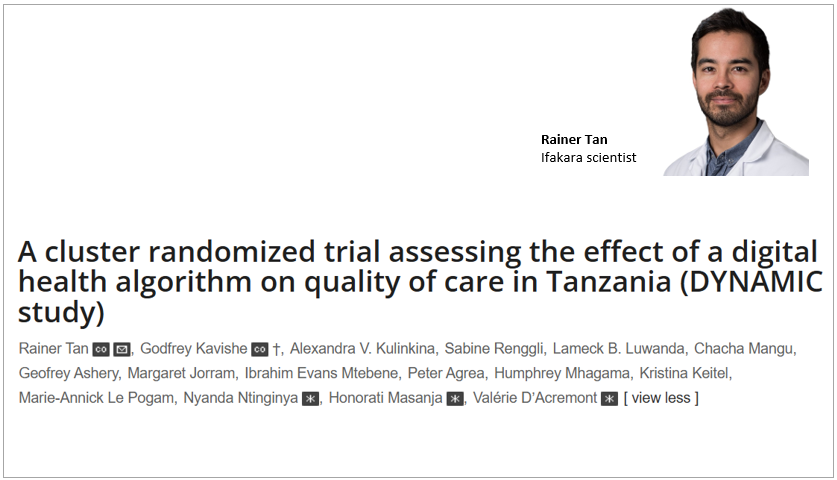
CHILD HEALTH: Transforming healthcare quality with digital solutions

A groundbreaking study by Ifakara Health Institute and partners conducted in Tanzania has revealed how a digital health tool, called ePOCT+, is improving the care of sick children in primary healthcare facilities.
Published on the PLOS Digital Health, the study shows that this innovative tool has enhanced how healthcare providers assess symptoms in children aged 2 to 59 months.
Key findings
The research found that using ePOCT+ led to a 15% improvement in assessing critical symptoms related to serious illnesses, such as pneumonia, malaria, and diarrhea. While this progress is significant, it also highlighted gaps in care, as some symptoms and signs were still not routinely assessed.
This finding emphasizes the need for continued efforts to raise the overall quality of paediatric care in healthcare facilities.
What is ePOCT+?
ePOCT+ stands for Electronic Point-of-Care Tool. It’s a digital tool designed to help healthcare providers diagnose and treat children effectively by following the Integrated Management of Childhood Illness (IMCI) guidelines. IMCI is a globally recognized framework developed by the World Health Organization (WHO) and UNICEF to improve the health and survival of children under five.
With ePOCT+, healthcare workers are guided step-by-step in assessing symptoms, identifying illnesses, and determining the best treatment, ensuring children receive accurate and timely care.
Why does it matter?
In places like Tanzania, where children face a high risk of serious illnesses, tools like ePOCT+ are game-changers. They empower healthcare workers with the knowledge and technology needed to save lives and reduce the burden of preventable diseases.
This study reinforces the potential of digital health solutions in transforming child healthcare and highlights the need for more innovations to close remaining gaps in quality care.
Evaluating the impact of ePOCT+
While digital health tools like the ePOCT+ have been designed to support healthcare workers in providing better patient care, their real-world effectiveness remains uncertain. This study aimed to evaluate the impact of ePOCT+, in combination with point-of-care diagnostic tools such as C-reactive protein (CRP) tests and pulse oximetry. The study also included comprehensive training and mentorship for healthcare providers.
Conducted as part of the DYNAMIC Tanzania project, the study took place between December 1, 2021, and October 31, 2022. Scientists from Ifakara Health Institute, the National Institute of Medical Research-Mbeya (NIMR-Mbeya), Swiss TPH, and the University of Lausanne contributed to the study, with Ifakara’s Rainer Tan and NIMR-Mbeya’s Godfrey Kavishe serving as lead authors.
Addressing identified challenges
Despite the benefits of ePOCT+, the scientists underlined the need to address the identified challenges in order to fully realize the potential of the tools.
“These findings suggest that digital health tools can improve the quality of care and address issues like over-prescription of antibiotics. However, broader strategies are needed to support healthcare workers in delivering comprehensive, high-quality care in similar settings globally,” the scientists noted.
Approaches for improvement, way forward
While digital tools like ePOCT+ have shown promise in improving the assessment of sick children and reducing unnecessary antibiotic use, more work is needed to ensure healthcare providers fully follow IMCI guidelines.
Furthermore, the study underlines the need to support the digital tools with additional measures, including regular training and mentorship for healthcare providers, performance monitoring to encourage better adherence to guidelines, and incentives and accountability to improve healthcare delivery.
Ifakara scientists involved in the study
Scientists from the Ifakara Health Institute, including Rainer Tan (co-lead author), Sabine Renggli, Lameck Luwanda, Geofrey Ashery, Margaret Jorram, Ibrahim Evans Mtebene, and Honorati Masanja, made significant contributions to the study.
More contributors came from scientists at NIMR-Mbeya, including Godfrey Kavishe (co-lead author), Chacha Mangu, Peter Agrea, Humphrey Mhagama, and Nyanda Ntinginya.
Additionally, Marie-Annick Le Pogam and Valérie D’Acremont from the University of Lausanne, along with Alexandra Kulinkina, Kristina Keitel, and Valérie D’Acremont from the Swiss TPH, were among the contributors.
Read the publication here.
